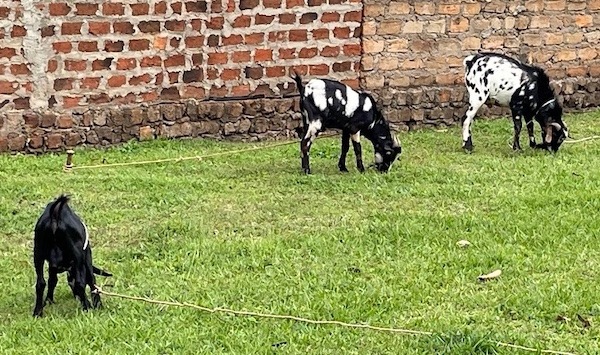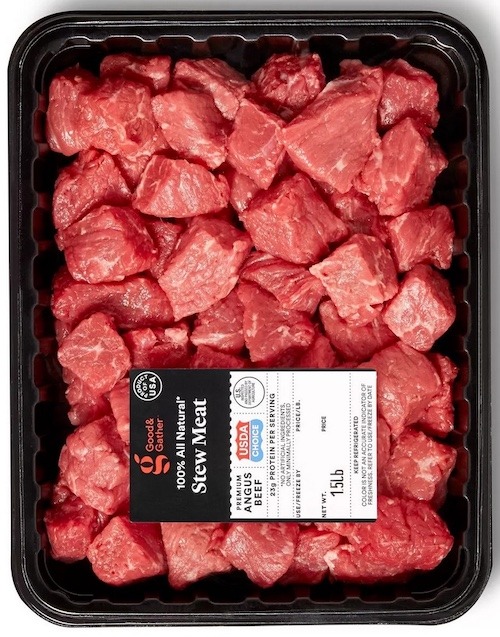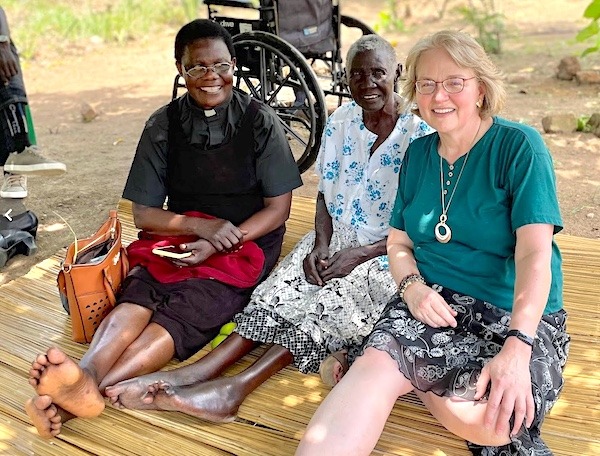A few months ago I went to Uganda to visit an Old Testament scholar there, Rev. Dr. Milly Erema, who reads the Bible with “ancient” eyes. (More below.) Many of her insights come from living in a traditional eastern African society not far from the biblical world, culturally.
Answers to many modern biblical conundrums become apparent when read you the Bible in light of this reality. Below are just a few observations I made on my visit:

1. Your Problem is Your Refrigerator
Bible readers often abandon their yearly reading resolutions at Leviticus because they find the sacrifices gory and offputting. The thought of slitting throats and pouring out blood repulses us. We find it hard to imagine that biblical peoples found this kind of worship meaningful.
May I suggest that this problem is actually your refrigerator?
Here’s why I say this. When I was visiting Milly, I saw she had a flock of goats. Were they for milk, I asked? Or were they for keeping the grass short or eating the weeds? Were they pets?
No, they are for eating. Either for Christmas and Easter, or maybe a wedding or funeral. Ugandans eat meat only rarely because it is very costly, and they often raise the animals they eat themselves. Milly will likely kill and prepare the goat for the meal herself.
Contrast this with life in America, where a typical refrigerator is liberally stocked with shrink-wrapped slabs on Styrofoam trays. Many people eat meat at every meal, yet little thought occurs to us of where it came from. The bloody reality of the animal’s death has been hidden away from us in meat processing plants. Because of refrigeration and industrial meat processing, we can experience meat as neat little pinkish blobs that we pop into a pan for supper.
 While this is not a bad thing in itself, it does make it so that when we open Leviticus, we’re horrified and disgusted because the Bible has pulled the curtain back on how the meat in our refrigerator actually got to us!
While this is not a bad thing in itself, it does make it so that when we open Leviticus, we’re horrified and disgusted because the Bible has pulled the curtain back on how the meat in our refrigerator actually got to us!
What is truly ironic is that we see ourselves as more refined and morally sensitive than the Israelites who worshiped God with sacrifice, when it’s actually just the opposite way around.
In the Ancient Near East it was universally believed that an animal couldn’t be eaten unless a deity had been thanked through some kind of sacred meal. The Torah specified that people could eat meat as long as they poured out the blood to honor God as the owner of the animal’s life. (Deut. 12:15-16).
All of the ancient peoples knew they needed to somehow pause and thank God for the life taken, yet it doesn’t occur to us to acknowledge the animal’s life in any way! (See footnote.)
Other Ugandan pastors I know have commented on this too. More than one has said that they find it somewhat painful to watch Americans consume large amounts of meat, yet have no appreciation of the lives of the animals they are eating. Christians in Uganda often include in their prayers a thanksgiving to God who gave life to the animal that is now nourishing his people.
2. A Pleasing Aroma to the LORD
Another aspect of biblical worship that doesn’t make much sense to us is the idea of God savoring the “pleasing aroma” of a sacrifice.
This made much more sense to me when I realized that when times are lean in Uganda, meals are only eaten once a day. I spent a week at the Christian school that Milly established to minister to orphans and vulnerable youth, and money is tight right now. Food prices are high because of drought and inflation. Both students and staff eat just one meal in the evening, which is beans, vegetables and poshe, a corn-based mush.

Everyone gets hungry in the late afternoon, and when you’re hungry, the smell of food cooking is mouth-watering. To someone who is gnawingly hungry, the aroma of a well-marbled cut of meat sizzling on the grill is absolutely out-of-this-world.
When a worshiper offered up some of this precious meal to God by roasting it on the altar for him savor, it was a true sacrifice.
Once again, it’s because we are never really hungry that we don’t have an intuitive sense of the amazing aroma of a sacrifice being offered up to God.
3. The Preciousness of Rain
In Uganda, much of a persons earnings go toward food, which is expensive. Little is left for anything else. Most people who aren’t in the city live as subsistence farmers, growing gardens which they depend on for food to eat. Just like in the Bible, they depend on God for sending rain that keeps their gardens alive, and when drought comes, it is a disaster. This year, the eastern horn of Africa has experienced the worst drought in 40 years, and Uganda is on the edge of it.
Milly’s aged mother still lives with the extended family in the traditional village where Milly grew up, without electricity or running water. There, people draw water directly from the nearby stream. The stream has gotten lower and lower – just imagine what will happen if the drought does not end soon!

(The picture here is of Milly, her mother and myself. Milly has been ordained as an Anglican priest along with being a college professor – very unusual for Uganda.)
We see a rainy day as a bad day, but the Bible sees rain as a precious gift from God. Jesus says, “I say to you, Love your enemies and pray for those who persecute you, so that you may be sons of your Father who is in heaven. For he makes his sun rise on the evil and on the good, and sends rain on the just and on the unjust.” (Matt 5:44-45) Here, Jesus is highlighting how God shows love toward his enemies by sending them rain that keeps them alive.
The rabbis commented, “Greater is the day of rain than the resurrection of the dead, because the resurrection of the dead benefits only the righteous, but rain benefits both the righteous and the unrighteous.” Some day the wicked will face judgment, but until then God’s gracious love for all of humanity is shown every time he sends rain.
We need rain and water and food just as much they did in the biblical world, but we don’t grasp this truth because our convenient, industrialized lifestyle has distanced us from this fundamental need.
As I’ve thought about it, I’ve come to realize that the Scriptures were written more for the world where my Ugandan friends live than they were for my wealthy Western reality.
~~~~~
* Here’s a comment from Jewish scholar Gunther Plaut on ancient sacrifice (from The Torah: A Modern Commentary):
What do moderns consider “primitive” about such rituals? …Most likely it is the public nature of the ancient slaughtering process that is repellent to current tastes. We prefer to hide the procedure behind the walls of abattoirs where the animals are killed in a fashion no less bloody, but without making it necessary for the consumer to witness the life and death cycle, which goes into his pleasurable nourishment.
Moreover, even when we share with others in the eating process, we do not generally experience any of the genuinely worthy emotions, which were usually engendered by the sacrifices of old. In the root meaning of the English word, we do not “sacrifice” (that is, we do not render holy) anything when we eat.
This does not mean that our age ought to be ready for any reconsideration of cultic sacrifice. It does suggest that when seen in its own context the biblical order of animal offerings was a genuine form of worship that cannot be quickly dismissed with prejudicial contemporary judgments.
~~~~~
Post Note: What I’ve been Working on with Milly Erema
Some of you will remember last fall that I wrote a post called “Reading the Bible Through Ancient Eyes.” It was about hosting an Old Testament scholar from Uganda, Milly Erema, in my home and taking her to the Society of Biblical Literature meeting, where she impressed the scholars at an Old Testament session so much they invited her to speak at an SBL this next year.
(One thing I realized over time was that isn’t right to say that Milly reads the Bible with “ancient” eyes, because her reality is that of many in the world even today. It’s better to say that she reads the Bible “as an insider,” which is what her seminary professors used to say.)
 This past April (2021) I decided to visit her in Uganda – partly for the sake of writing, and partly because of her ministry which provides orphans and vulnerable youth with an education they could not get otherwise. Northern Uganda is one of the most devastated places on the planet because of war and dictators like Idi Amin.
This past April (2021) I decided to visit her in Uganda – partly for the sake of writing, and partly because of her ministry which provides orphans and vulnerable youth with an education they could not get otherwise. Northern Uganda is one of the most devastated places on the planet because of war and dictators like Idi Amin.
Milly grew up there, and is saving the lives of youths who have no hope of anything but utter poverty. By giving them an education and a strong faith in Christ, she enables them to get good jobs and become community leaders who will mend their devastated country.
Personally I feel her ministry is extremely worthy of support – so much so that I traveled around the world to see it, and then spent months working on a website to get the word out. I just finished the site! Check it out: KingswayUganda.com.
I’ve written a few posts on the blog there, including even some about what I’m learning about my Bible from Milly. Like this post, “What Meals are Like at Kingsway,” for instance. If you like my writing, sign up to get Kingsway’s emails to stay in touch.
Milly has run Kingsway for years with almost no outside support, spending her own meager $4000/year college professor salary to keep it going. But because of COVID, inflation and drought, the school is facing a financial crisis this year.
Please seriously consider supporting this very worthy ministry. I personally guarantee you that your money will be spent very carefully and will help the poorest people on earth.

Janet K says
I love this lesson on the importance of meat, blood, and rain. I always thank God for my food, but now I can give Him even better thanks, and I can better appreciate what God has given me every day.
I happen to be looking for a new charity to donate to, because one I was giving to had to close. I think I just found what I was looking for!
Thanks Lois for bringing Kingsway Uganda to my attention! Thank you for creating their website too.
Jeffrey L says
I love the opportunity to connect and contribute to what the Lord is doing through Dr. Milly Erema of Kingsway ministry. Thanks!
Billie James Chapman says
I recently read Reading the Old Testament through Jewish Eyes by Rabbi Evan Moffic. It brought to light many misconceptions about sacrifice and rituals in the Old Testament. Sacrifice being necessary because we are sinful and can never come up to God’s standards and ritual because it impresses upon us the need to continue to aim for perfection and God’s standards. Jesus sacrifice has offered us a relationship with God that we could never have even through the rituals and sacrifices of the Old Testament. I have really enjoyed your books and insights. Thank you.
Barbara Hyland says
Wow……..you nailed it. I do so appreciate your thoughts on the sacrifical system and what it meant to the people of God. I do know that primative sociaities offered sacrficies….but then they offered their children to appease an angry God. We can realize how precious human life becomes. That’s what got the early Israelities into deep trouble. How does this effect us today with our human sacrifice……we call it abortion but its really the same.
Thanks for your thougts on this.
LauraLee Ogan says
What you write here about giving gratitude to and the reverence for the life taken reminds me of the little bit I know about the native American culture that preceded us on our continent. Their “primitive” culture was far more sophisticated, reverent, and humane than our European ancestors (and most of our contemporaries) could comprehend. And I do believe that, though they didn’t know of Jesus and His life, they certainly had reverence for a Creator they referred to as the Great Spirit.
Toni says
Lois, I was thrilled that this article provided a link so that we can make donations for the needs. Molly is an amazing lady, as are you! It’s a privilege to support this kingdom work!